Sociological Theories of Deviance and Illness: A Comprehensive Report
VerifiedAdded on 2023/01/11
|7
|2065
|74
Report
AI Summary
This report delves into the sociology of health, examining illness as a form of deviance. It begins by defining health and illness, then explores various sociological theories related to deviance, including social strain typology, structural functionalism, conflict theory, and labeling theory. The report also discusses the sick role theory, as proposed by Talcott Parsons, and analyzes different types of deviance such as conformity, innovation, ritualism, retreatism, and rebellion. The conclusion emphasizes the importance of health and the impact of illness, while highlighting the relevance of sociological theories in understanding deviant behaviors. The report references several books and journals to support its findings.
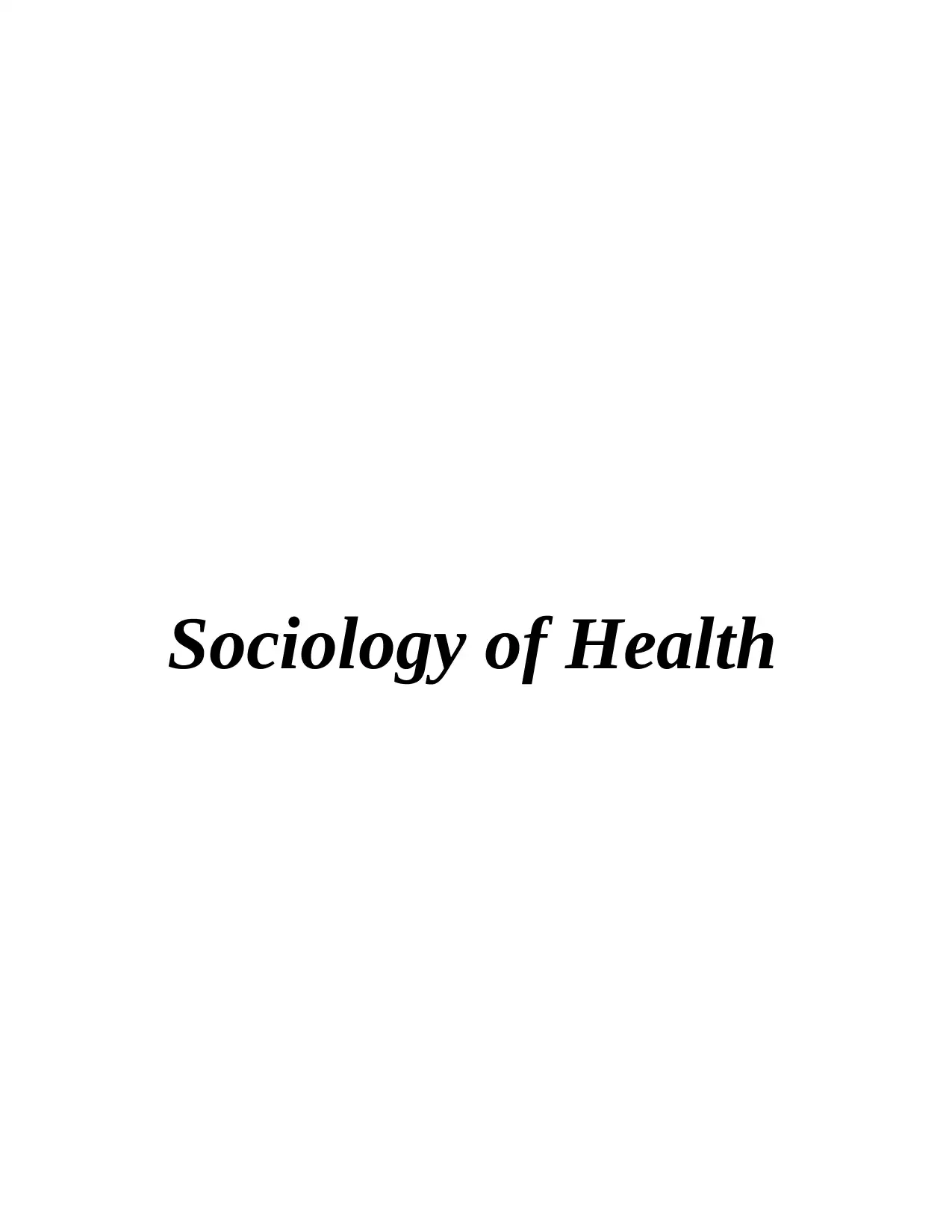
Sociology of Health
Paraphrase This Document
Need a fresh take? Get an instant paraphrase of this document with our AI Paraphraser
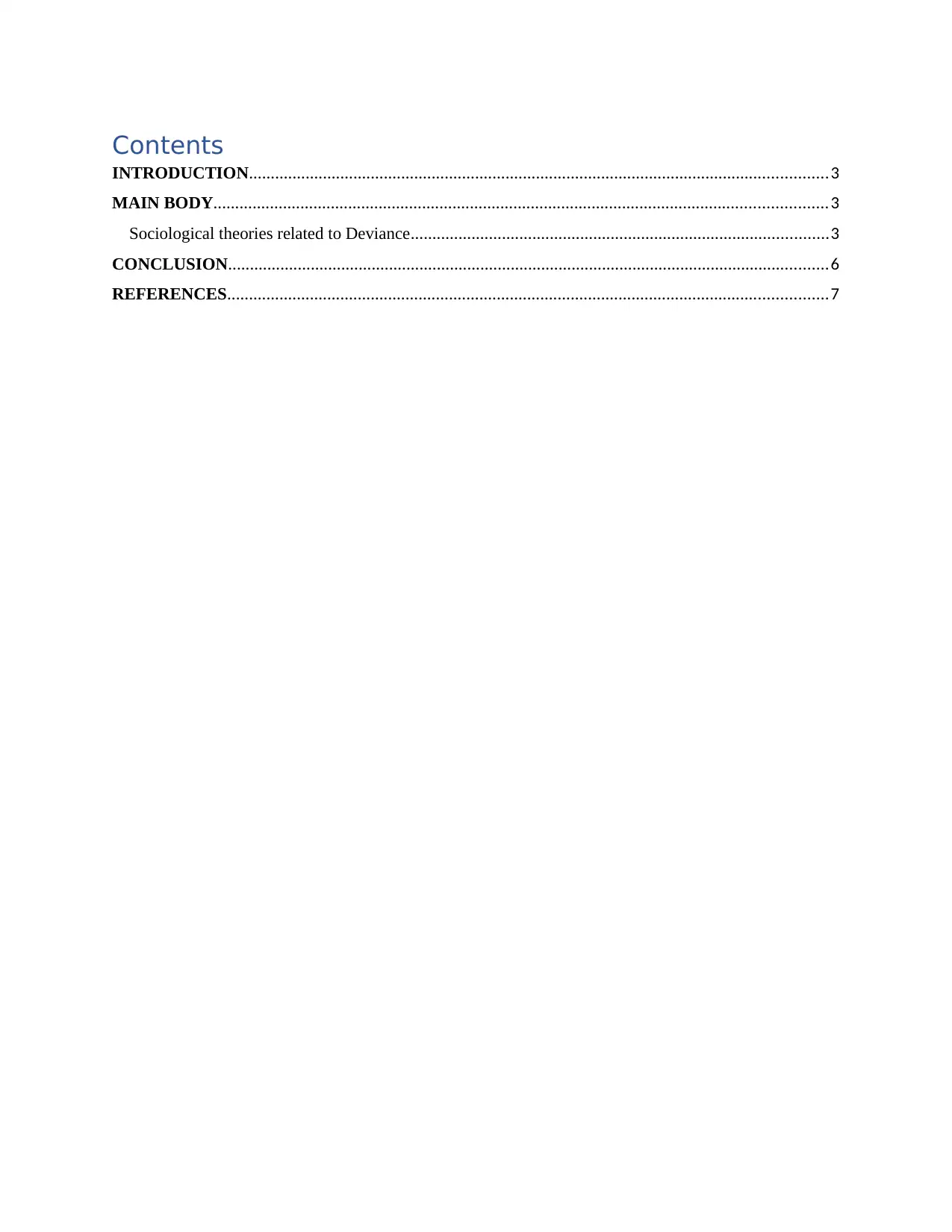
Contents
INTRODUCTION.....................................................................................................................................3
MAIN BODY.............................................................................................................................................3
Sociological theories related to Deviance................................................................................................3
CONCLUSION..........................................................................................................................................6
REFERENCES..........................................................................................................................................7
INTRODUCTION.....................................................................................................................................3
MAIN BODY.............................................................................................................................................3
Sociological theories related to Deviance................................................................................................3
CONCLUSION..........................................................................................................................................6
REFERENCES..........................................................................................................................................7
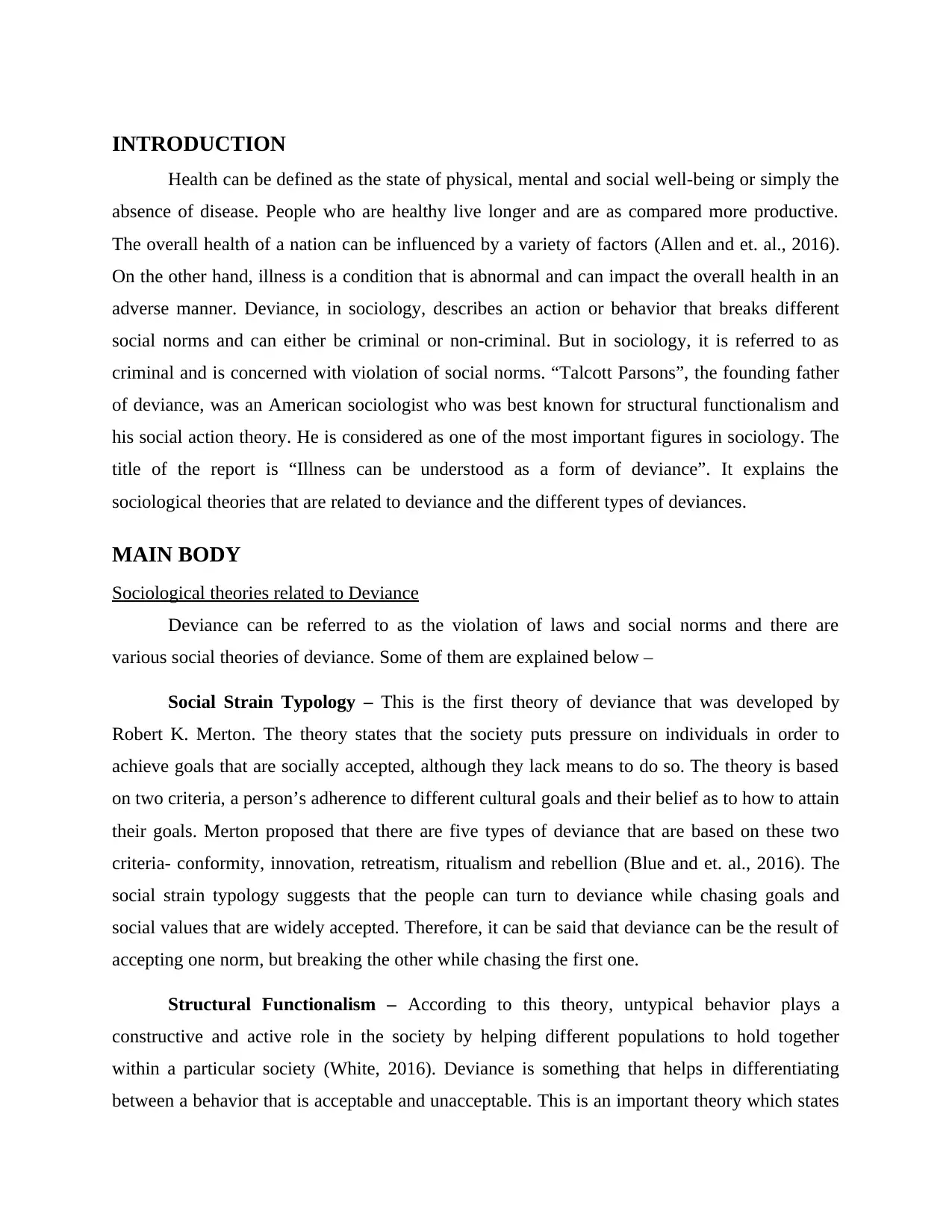
INTRODUCTION
Health can be defined as the state of physical, mental and social well-being or simply the
absence of disease. People who are healthy live longer and are as compared more productive.
The overall health of a nation can be influenced by a variety of factors (Allen and et. al., 2016).
On the other hand, illness is a condition that is abnormal and can impact the overall health in an
adverse manner. Deviance, in sociology, describes an action or behavior that breaks different
social norms and can either be criminal or non-criminal. But in sociology, it is referred to as
criminal and is concerned with violation of social norms. “Talcott Parsons”, the founding father
of deviance, was an American sociologist who was best known for structural functionalism and
his social action theory. He is considered as one of the most important figures in sociology. The
title of the report is “Illness can be understood as a form of deviance”. It explains the
sociological theories that are related to deviance and the different types of deviances.
MAIN BODY
Sociological theories related to Deviance
Deviance can be referred to as the violation of laws and social norms and there are
various social theories of deviance. Some of them are explained below –
Social Strain Typology – This is the first theory of deviance that was developed by
Robert K. Merton. The theory states that the society puts pressure on individuals in order to
achieve goals that are socially accepted, although they lack means to do so. The theory is based
on two criteria, a person’s adherence to different cultural goals and their belief as to how to attain
their goals. Merton proposed that there are five types of deviance that are based on these two
criteria- conformity, innovation, retreatism, ritualism and rebellion (Blue and et. al., 2016). The
social strain typology suggests that the people can turn to deviance while chasing goals and
social values that are widely accepted. Therefore, it can be said that deviance can be the result of
accepting one norm, but breaking the other while chasing the first one.
Structural Functionalism – According to this theory, untypical behavior plays a
constructive and active role in the society by helping different populations to hold together
within a particular society (White, 2016). Deviance is something that helps in differentiating
between a behavior that is acceptable and unacceptable. This is an important theory which states
Health can be defined as the state of physical, mental and social well-being or simply the
absence of disease. People who are healthy live longer and are as compared more productive.
The overall health of a nation can be influenced by a variety of factors (Allen and et. al., 2016).
On the other hand, illness is a condition that is abnormal and can impact the overall health in an
adverse manner. Deviance, in sociology, describes an action or behavior that breaks different
social norms and can either be criminal or non-criminal. But in sociology, it is referred to as
criminal and is concerned with violation of social norms. “Talcott Parsons”, the founding father
of deviance, was an American sociologist who was best known for structural functionalism and
his social action theory. He is considered as one of the most important figures in sociology. The
title of the report is “Illness can be understood as a form of deviance”. It explains the
sociological theories that are related to deviance and the different types of deviances.
MAIN BODY
Sociological theories related to Deviance
Deviance can be referred to as the violation of laws and social norms and there are
various social theories of deviance. Some of them are explained below –
Social Strain Typology – This is the first theory of deviance that was developed by
Robert K. Merton. The theory states that the society puts pressure on individuals in order to
achieve goals that are socially accepted, although they lack means to do so. The theory is based
on two criteria, a person’s adherence to different cultural goals and their belief as to how to attain
their goals. Merton proposed that there are five types of deviance that are based on these two
criteria- conformity, innovation, retreatism, ritualism and rebellion (Blue and et. al., 2016). The
social strain typology suggests that the people can turn to deviance while chasing goals and
social values that are widely accepted. Therefore, it can be said that deviance can be the result of
accepting one norm, but breaking the other while chasing the first one.
Structural Functionalism – According to this theory, untypical behavior plays a
constructive and active role in the society by helping different populations to hold together
within a particular society (White, 2016). Deviance is something that helps in differentiating
between a behavior that is acceptable and unacceptable. This is an important theory which states
⊘ This is a preview!⊘
Do you want full access?
Subscribe today to unlock all pages.

Trusted by 1+ million students worldwide
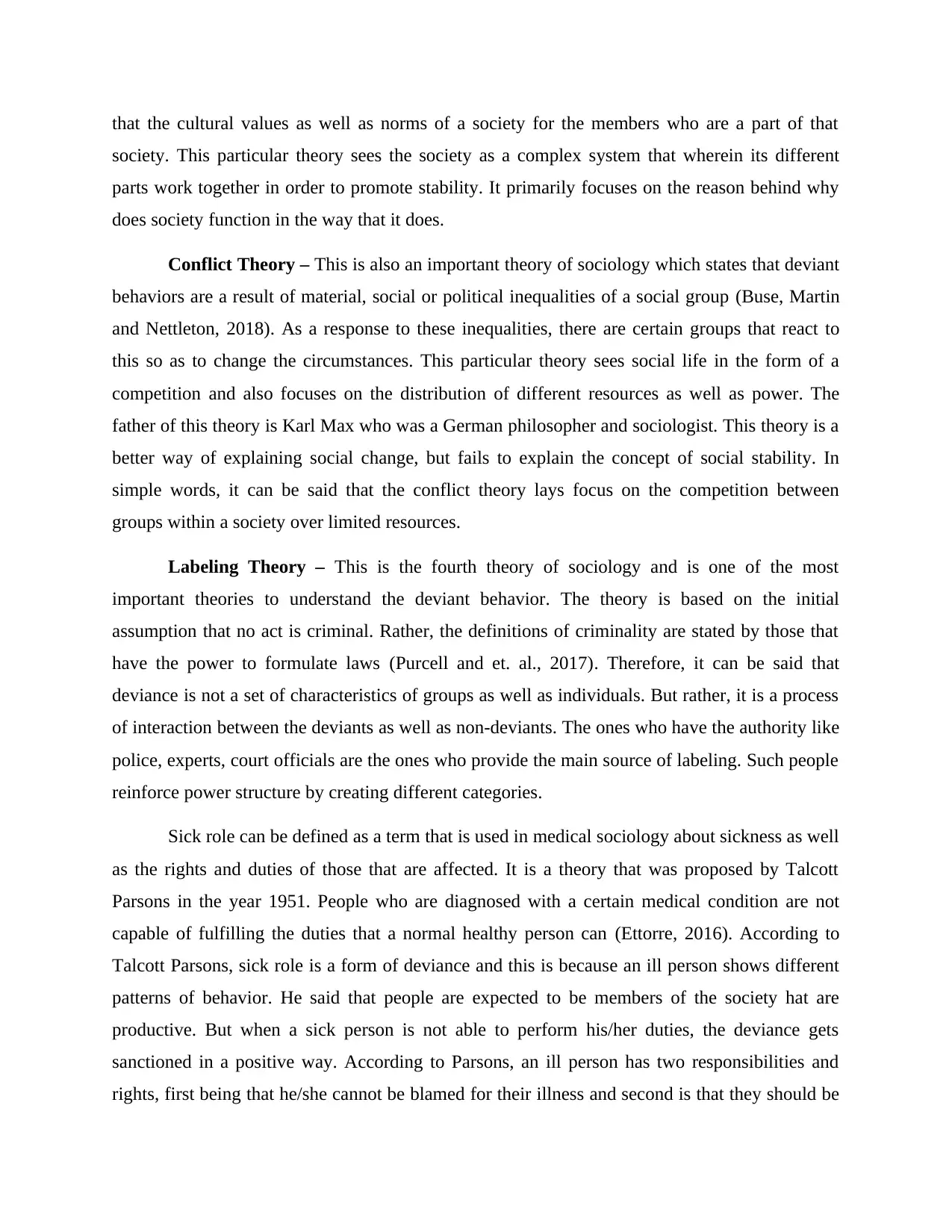
that the cultural values as well as norms of a society for the members who are a part of that
society. This particular theory sees the society as a complex system that wherein its different
parts work together in order to promote stability. It primarily focuses on the reason behind why
does society function in the way that it does.
Conflict Theory – This is also an important theory of sociology which states that deviant
behaviors are a result of material, social or political inequalities of a social group (Buse, Martin
and Nettleton, 2018). As a response to these inequalities, there are certain groups that react to
this so as to change the circumstances. This particular theory sees social life in the form of a
competition and also focuses on the distribution of different resources as well as power. The
father of this theory is Karl Max who was a German philosopher and sociologist. This theory is a
better way of explaining social change, but fails to explain the concept of social stability. In
simple words, it can be said that the conflict theory lays focus on the competition between
groups within a society over limited resources.
Labeling Theory – This is the fourth theory of sociology and is one of the most
important theories to understand the deviant behavior. The theory is based on the initial
assumption that no act is criminal. Rather, the definitions of criminality are stated by those that
have the power to formulate laws (Purcell and et. al., 2017). Therefore, it can be said that
deviance is not a set of characteristics of groups as well as individuals. But rather, it is a process
of interaction between the deviants as well as non-deviants. The ones who have the authority like
police, experts, court officials are the ones who provide the main source of labeling. Such people
reinforce power structure by creating different categories.
Sick role can be defined as a term that is used in medical sociology about sickness as well
as the rights and duties of those that are affected. It is a theory that was proposed by Talcott
Parsons in the year 1951. People who are diagnosed with a certain medical condition are not
capable of fulfilling the duties that a normal healthy person can (Ettorre, 2016). According to
Talcott Parsons, sick role is a form of deviance and this is because an ill person shows different
patterns of behavior. He said that people are expected to be members of the society hat are
productive. But when a sick person is not able to perform his/her duties, the deviance gets
sanctioned in a positive way. According to Parsons, an ill person has two responsibilities and
rights, first being that he/she cannot be blamed for their illness and second is that they should be
society. This particular theory sees the society as a complex system that wherein its different
parts work together in order to promote stability. It primarily focuses on the reason behind why
does society function in the way that it does.
Conflict Theory – This is also an important theory of sociology which states that deviant
behaviors are a result of material, social or political inequalities of a social group (Buse, Martin
and Nettleton, 2018). As a response to these inequalities, there are certain groups that react to
this so as to change the circumstances. This particular theory sees social life in the form of a
competition and also focuses on the distribution of different resources as well as power. The
father of this theory is Karl Max who was a German philosopher and sociologist. This theory is a
better way of explaining social change, but fails to explain the concept of social stability. In
simple words, it can be said that the conflict theory lays focus on the competition between
groups within a society over limited resources.
Labeling Theory – This is the fourth theory of sociology and is one of the most
important theories to understand the deviant behavior. The theory is based on the initial
assumption that no act is criminal. Rather, the definitions of criminality are stated by those that
have the power to formulate laws (Purcell and et. al., 2017). Therefore, it can be said that
deviance is not a set of characteristics of groups as well as individuals. But rather, it is a process
of interaction between the deviants as well as non-deviants. The ones who have the authority like
police, experts, court officials are the ones who provide the main source of labeling. Such people
reinforce power structure by creating different categories.
Sick role can be defined as a term that is used in medical sociology about sickness as well
as the rights and duties of those that are affected. It is a theory that was proposed by Talcott
Parsons in the year 1951. People who are diagnosed with a certain medical condition are not
capable of fulfilling the duties that a normal healthy person can (Ettorre, 2016). According to
Talcott Parsons, sick role is a form of deviance and this is because an ill person shows different
patterns of behavior. He said that people are expected to be members of the society hat are
productive. But when a sick person is not able to perform his/her duties, the deviance gets
sanctioned in a positive way. According to Parsons, an ill person has two responsibilities and
rights, first being that he/she cannot be blamed for their illness and second is that they should be
Paraphrase This Document
Need a fresh take? Get an instant paraphrase of this document with our AI Paraphraser
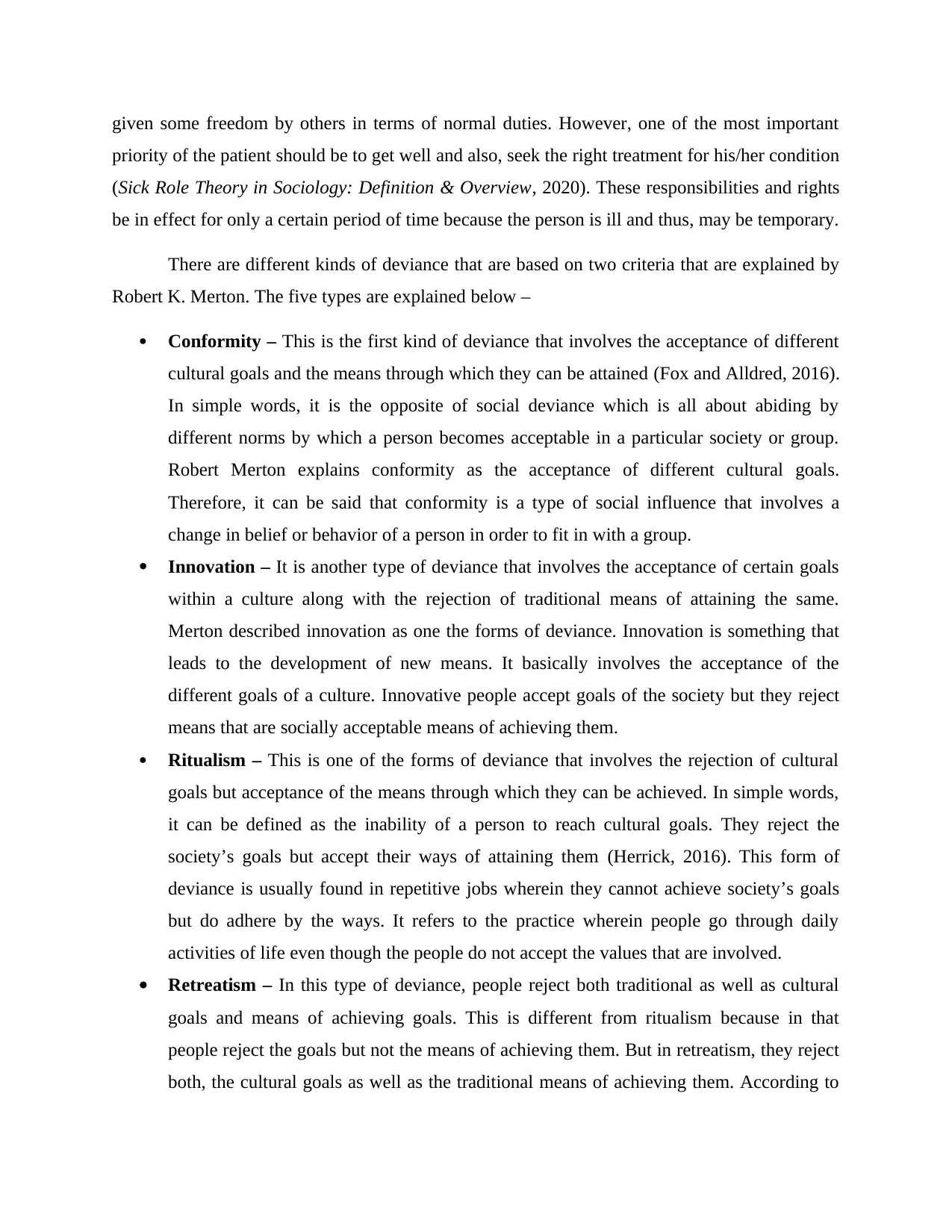
given some freedom by others in terms of normal duties. However, one of the most important
priority of the patient should be to get well and also, seek the right treatment for his/her condition
(Sick Role Theory in Sociology: Definition & Overview, 2020). These responsibilities and rights
be in effect for only a certain period of time because the person is ill and thus, may be temporary.
There are different kinds of deviance that are based on two criteria that are explained by
Robert K. Merton. The five types are explained below –
Conformity – This is the first kind of deviance that involves the acceptance of different
cultural goals and the means through which they can be attained (Fox and Alldred, 2016).
In simple words, it is the opposite of social deviance which is all about abiding by
different norms by which a person becomes acceptable in a particular society or group.
Robert Merton explains conformity as the acceptance of different cultural goals.
Therefore, it can be said that conformity is a type of social influence that involves a
change in belief or behavior of a person in order to fit in with a group.
Innovation – It is another type of deviance that involves the acceptance of certain goals
within a culture along with the rejection of traditional means of attaining the same.
Merton described innovation as one the forms of deviance. Innovation is something that
leads to the development of new means. It basically involves the acceptance of the
different goals of a culture. Innovative people accept goals of the society but they reject
means that are socially acceptable means of achieving them.
Ritualism – This is one of the forms of deviance that involves the rejection of cultural
goals but acceptance of the means through which they can be achieved. In simple words,
it can be defined as the inability of a person to reach cultural goals. They reject the
society’s goals but accept their ways of attaining them (Herrick, 2016). This form of
deviance is usually found in repetitive jobs wherein they cannot achieve society’s goals
but do adhere by the ways. It refers to the practice wherein people go through daily
activities of life even though the people do not accept the values that are involved.
Retreatism – In this type of deviance, people reject both traditional as well as cultural
goals and means of achieving goals. This is different from ritualism because in that
people reject the goals but not the means of achieving them. But in retreatism, they reject
both, the cultural goals as well as the traditional means of achieving them. According to
priority of the patient should be to get well and also, seek the right treatment for his/her condition
(Sick Role Theory in Sociology: Definition & Overview, 2020). These responsibilities and rights
be in effect for only a certain period of time because the person is ill and thus, may be temporary.
There are different kinds of deviance that are based on two criteria that are explained by
Robert K. Merton. The five types are explained below –
Conformity – This is the first kind of deviance that involves the acceptance of different
cultural goals and the means through which they can be attained (Fox and Alldred, 2016).
In simple words, it is the opposite of social deviance which is all about abiding by
different norms by which a person becomes acceptable in a particular society or group.
Robert Merton explains conformity as the acceptance of different cultural goals.
Therefore, it can be said that conformity is a type of social influence that involves a
change in belief or behavior of a person in order to fit in with a group.
Innovation – It is another type of deviance that involves the acceptance of certain goals
within a culture along with the rejection of traditional means of attaining the same.
Merton described innovation as one the forms of deviance. Innovation is something that
leads to the development of new means. It basically involves the acceptance of the
different goals of a culture. Innovative people accept goals of the society but they reject
means that are socially acceptable means of achieving them.
Ritualism – This is one of the forms of deviance that involves the rejection of cultural
goals but acceptance of the means through which they can be achieved. In simple words,
it can be defined as the inability of a person to reach cultural goals. They reject the
society’s goals but accept their ways of attaining them (Herrick, 2016). This form of
deviance is usually found in repetitive jobs wherein they cannot achieve society’s goals
but do adhere by the ways. It refers to the practice wherein people go through daily
activities of life even though the people do not accept the values that are involved.
Retreatism – In this type of deviance, people reject both traditional as well as cultural
goals and means of achieving goals. This is different from ritualism because in that
people reject the goals but not the means of achieving them. But in retreatism, they reject
both, the cultural goals as well as the traditional means of achieving them. According to
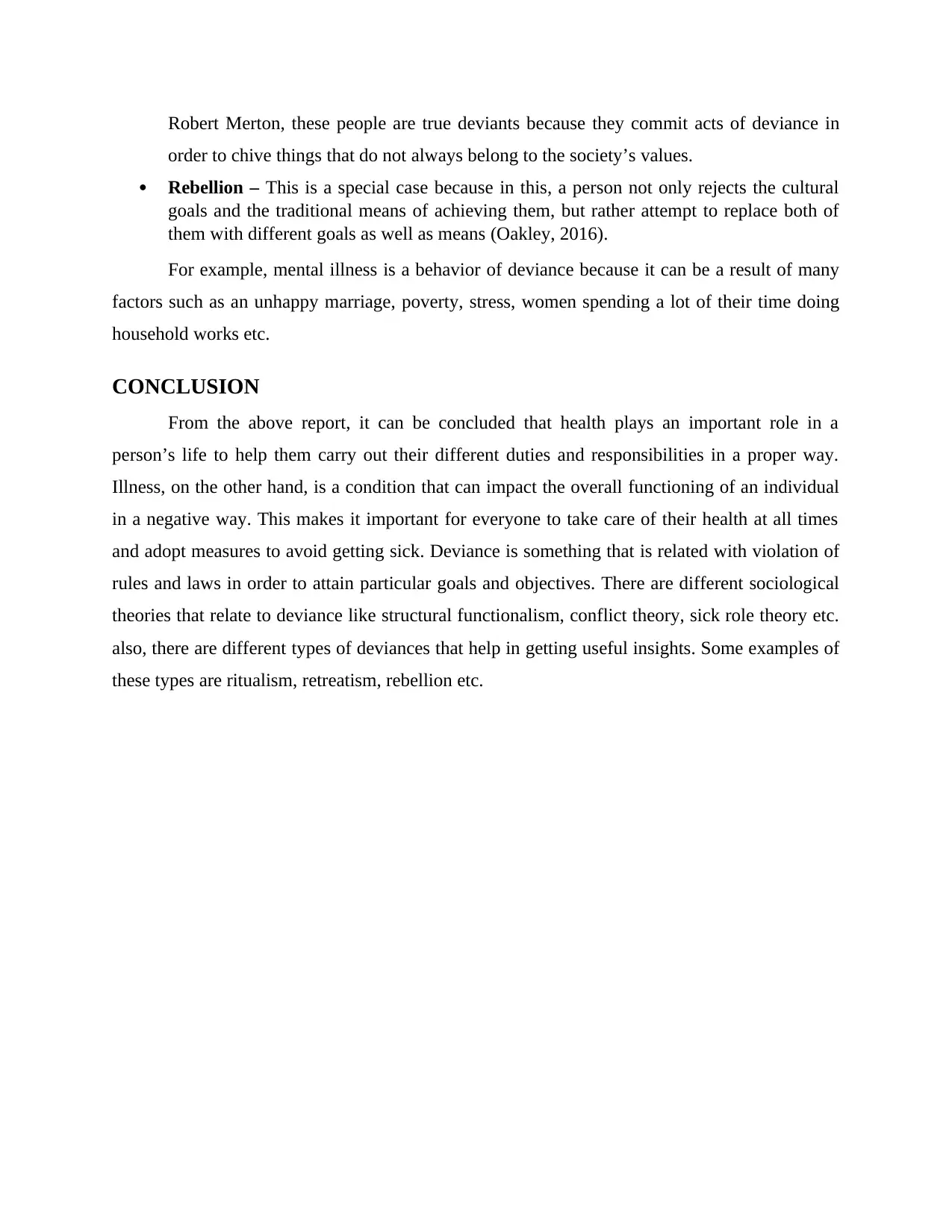
Robert Merton, these people are true deviants because they commit acts of deviance in
order to chive things that do not always belong to the society’s values.
Rebellion – This is a special case because in this, a person not only rejects the cultural
goals and the traditional means of achieving them, but rather attempt to replace both of
them with different goals as well as means (Oakley, 2016).
For example, mental illness is a behavior of deviance because it can be a result of many
factors such as an unhappy marriage, poverty, stress, women spending a lot of their time doing
household works etc.
CONCLUSION
From the above report, it can be concluded that health plays an important role in a
person’s life to help them carry out their different duties and responsibilities in a proper way.
Illness, on the other hand, is a condition that can impact the overall functioning of an individual
in a negative way. This makes it important for everyone to take care of their health at all times
and adopt measures to avoid getting sick. Deviance is something that is related with violation of
rules and laws in order to attain particular goals and objectives. There are different sociological
theories that relate to deviance like structural functionalism, conflict theory, sick role theory etc.
also, there are different types of deviances that help in getting useful insights. Some examples of
these types are ritualism, retreatism, rebellion etc.
order to chive things that do not always belong to the society’s values.
Rebellion – This is a special case because in this, a person not only rejects the cultural
goals and the traditional means of achieving them, but rather attempt to replace both of
them with different goals as well as means (Oakley, 2016).
For example, mental illness is a behavior of deviance because it can be a result of many
factors such as an unhappy marriage, poverty, stress, women spending a lot of their time doing
household works etc.
CONCLUSION
From the above report, it can be concluded that health plays an important role in a
person’s life to help them carry out their different duties and responsibilities in a proper way.
Illness, on the other hand, is a condition that can impact the overall functioning of an individual
in a negative way. This makes it important for everyone to take care of their health at all times
and adopt measures to avoid getting sick. Deviance is something that is related with violation of
rules and laws in order to attain particular goals and objectives. There are different sociological
theories that relate to deviance like structural functionalism, conflict theory, sick role theory etc.
also, there are different types of deviances that help in getting useful insights. Some examples of
these types are ritualism, retreatism, rebellion etc.
⊘ This is a preview!⊘
Do you want full access?
Subscribe today to unlock all pages.

Trusted by 1+ million students worldwide
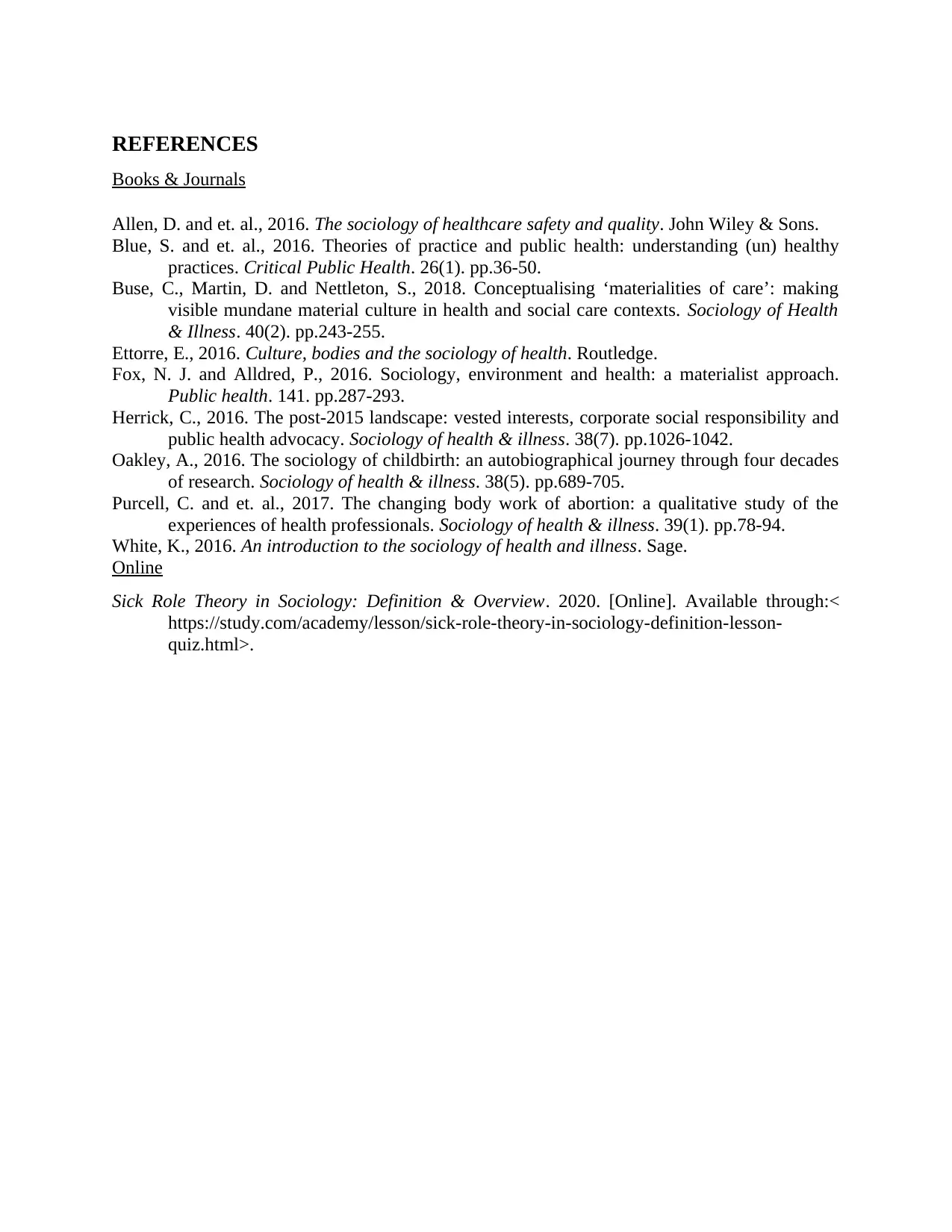
REFERENCES
Books & Journals
Allen, D. and et. al., 2016. The sociology of healthcare safety and quality. John Wiley & Sons.
Blue, S. and et. al., 2016. Theories of practice and public health: understanding (un) healthy
practices. Critical Public Health. 26(1). pp.36-50.
Buse, C., Martin, D. and Nettleton, S., 2018. Conceptualising ‘materialities of care’: making
visible mundane material culture in health and social care contexts. Sociology of Health
& Illness. 40(2). pp.243-255.
Ettorre, E., 2016. Culture, bodies and the sociology of health. Routledge.
Fox, N. J. and Alldred, P., 2016. Sociology, environment and health: a materialist approach.
Public health. 141. pp.287-293.
Herrick, C., 2016. The post‐2015 landscape: vested interests, corporate social responsibility and
public health advocacy. Sociology of health & illness. 38(7). pp.1026-1042.
Oakley, A., 2016. The sociology of childbirth: an autobiographical journey through four decades
of research. Sociology of health & illness. 38(5). pp.689-705.
Purcell, C. and et. al., 2017. The changing body work of abortion: a qualitative study of the
experiences of health professionals. Sociology of health & illness. 39(1). pp.78-94.
White, K., 2016. An introduction to the sociology of health and illness. Sage.
Online
Sick Role Theory in Sociology: Definition & Overview. 2020. [Online]. Available through:<
https://study.com/academy/lesson/sick-role-theory-in-sociology-definition-lesson-
quiz.html>.
Books & Journals
Allen, D. and et. al., 2016. The sociology of healthcare safety and quality. John Wiley & Sons.
Blue, S. and et. al., 2016. Theories of practice and public health: understanding (un) healthy
practices. Critical Public Health. 26(1). pp.36-50.
Buse, C., Martin, D. and Nettleton, S., 2018. Conceptualising ‘materialities of care’: making
visible mundane material culture in health and social care contexts. Sociology of Health
& Illness. 40(2). pp.243-255.
Ettorre, E., 2016. Culture, bodies and the sociology of health. Routledge.
Fox, N. J. and Alldred, P., 2016. Sociology, environment and health: a materialist approach.
Public health. 141. pp.287-293.
Herrick, C., 2016. The post‐2015 landscape: vested interests, corporate social responsibility and
public health advocacy. Sociology of health & illness. 38(7). pp.1026-1042.
Oakley, A., 2016. The sociology of childbirth: an autobiographical journey through four decades
of research. Sociology of health & illness. 38(5). pp.689-705.
Purcell, C. and et. al., 2017. The changing body work of abortion: a qualitative study of the
experiences of health professionals. Sociology of health & illness. 39(1). pp.78-94.
White, K., 2016. An introduction to the sociology of health and illness. Sage.
Online
Sick Role Theory in Sociology: Definition & Overview. 2020. [Online]. Available through:<
https://study.com/academy/lesson/sick-role-theory-in-sociology-definition-lesson-
quiz.html>.
1 out of 7
Related Documents
Your All-in-One AI-Powered Toolkit for Academic Success.
+13062052269
info@desklib.com
Available 24*7 on WhatsApp / Email
![[object Object]](/_next/static/media/star-bottom.7253800d.svg)
Unlock your academic potential
Copyright © 2020–2026 A2Z Services. All Rights Reserved. Developed and managed by ZUCOL.





